Stephen Colbert’s Super PAC Joke’s On Him
Virtually everything Stephen Colbert is doing was legal before Citizens United.
Stephen Colbert’s longstanding bit about his Super PAC has been amusing. But it has little to do with Citizens United or, indeed, anything new in campaign finance law.
Slate‘s Dahlia Lithwick (“Colbert v. the Court: Why, in the battle over Citizens United, the Supreme Court never had a chance“) is the latest to swoon over the shtick.
The comedian/presidential candidate/super PAC founder has probably done more to undermine public confidence in the court’s 2010 Citizens United opinion than anyone, including the dissenters. In this contest, the high court is supremely outmatched.
Citizens United, with an assist from a 1976 decision Buckley v. Valeo, has led to the farce of unlimited corporate election spending, “uncoordinated” super PACs that coordinate with candidates, and a noxious round of attack ads, all of which is protected in the name of free speech. Colbert has been educating Americans about the resulting insanity for months now. His broadside against the court raises important questions about satire and the court, about protecting the dignity of the institution, and the role of modern media in public discourse. Also: The fight between Colbert and the court is so full of ironies, it can make your molars hurt.
[…]
It all started when Colbert announced that, as permitted by Citizens United, he planned to form a super PAC(“Making a better tomorrow, tomorrow”). As he explained to his viewers, his hope was that “Colbert Nation could have a voice, in the form of my voice, shouted through a megaphone made of cash … the American dream. And that dream is simple. That anyone, no matter who they are, if they are determined, if they are willing to work hard enough, someday they could grow up to create a legal entity which could then receive unlimited corporate funds, which could be used to influence our elections.”
Then last June, like a winking, eyebrow-wagging Mr. Smith, Colbert went to Washington and testified before the FEC, which granted him permission to launch his super PAC (over the objections of his parent company Viacom) and accept unlimited contributions from his fans so he might sway elections. (He tweeted before his FEC appearance that PAC stands for “Plastic And/Or Cash.”) In recent weeks, Colbert has run several truly insane attack ads (including one accusing Mitt Romney of being a serial killer). Then, with perfect comedic pitch, Colbert handed off control of his super PAC to Jon Stewart (lampooning the FEC rules about coordination between “independent PACS” and candidates with a one-page legal document and a Vulcan mind meld). Colbert then managed to throw his support to non-candidate Herman Cain in the South Carolina primary, placing higher on the ballot than Rick Perry, Jon Huntsman, and Michele Bachmann.
But, as Paul Sherman of the Institute for Justice points out (“Colbert’s Super PAC Surprisingly Un-Super“), “Virtually everything Stephen Colbert is doing was legal before Citizens United.”
Colbert’s PAC, which raised more than $825,000 through the end of the year, has raised almost no corporate money. Indeed, the only two corporate donations he reported to the Federal Election Commission amount to $714, total. In addition to barely raising any corporate money, Colbert’s Super PAC accepted only one contribution from an individual (of $9,600) in excess of the $5,000 limit that applies to regular PACs.
In other words, more than 99% of the money Colbert has raised to mock Citizens United and Super PACs is money that has been legal under the campaign finance laws for decades.
So, the law might be mockworthy in its absurdity–okay, the law is mockworthy in its absurdity–but it’s been that way for a long time.
Then again, as I’ve noted before, I’m not entirely sure that Colbert’s intent was ever to mock Citizen’s United per se. While he muddied the waters a bit with the jokes about corporate money, he mostly seems just to be illustrating the absurdity of our campaign laws and their very weak attempts to keep money out of politics.
Indeed, while I’ll admit to not knowing many of the particular absurdities of the law prior to Colbert’s shining a sardonic light on them, I’ve been arguing for longer than I can remember that attempts to keep money out of politics are as futile as attempts to keep politics out of politics. Every closed loophole creates several new ones–usually even more egregious than the last in its contempt for the spirit of the law.
Sherman adds, “campaign finance laws are rarely a hindrance for people with television shows espousing political messages that are already popular. Those people already have the ability to get their message out to a national audience. Political upstarts or outsiders—the real beneficiaries of the rulings in Citizens United and SpeechNow.org v. FEC—don’t have that option.”
I’m not unsympathetic to Colbert and others who point to the outsized influence of those with big money on the process. But I’m not particularly worried about it in the particular arena of major election campaigns, given the degree to which they operate in the sunshine. I’d frankly prefer that Mitt Romney and Newt Gingrich themselves were spending the money and directly controlling the ads, rather than having the additional implausible deniability provided by having the money spent by Super PACs, 527s, and others who are ostensibly–or, in some cases, actually–independent doing it on their behalf. Television ads may be persuasive but they are, by definition, quite public.
I’m much more concerned with the influence that the extremely wealthy have in crafting and shaping our laws and regulations behind the scenes. That’s where the real power lies and it’s almost completely hidden from view.
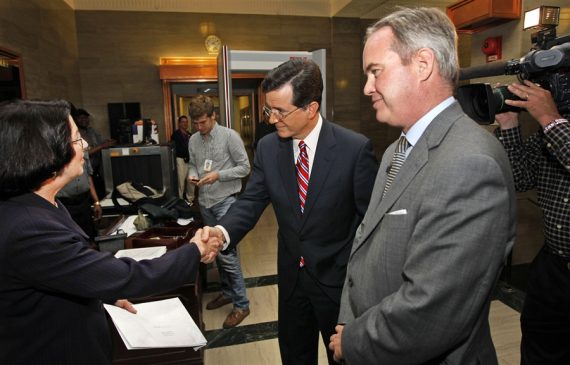

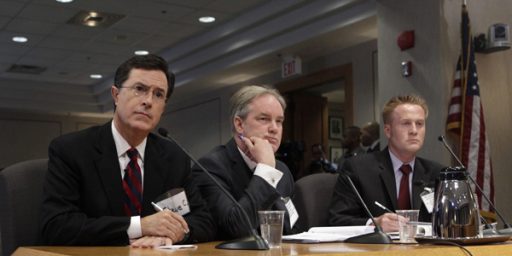
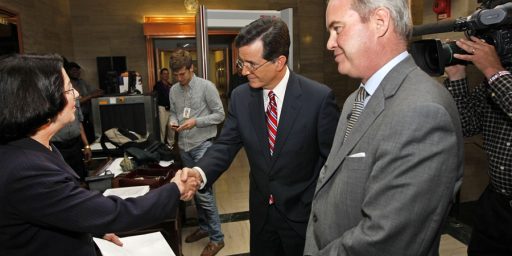
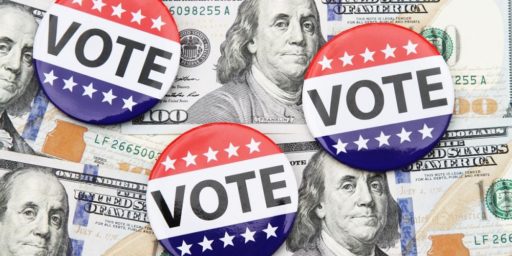
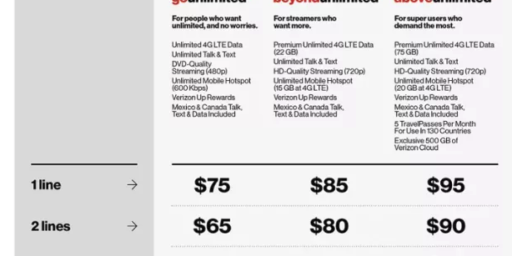
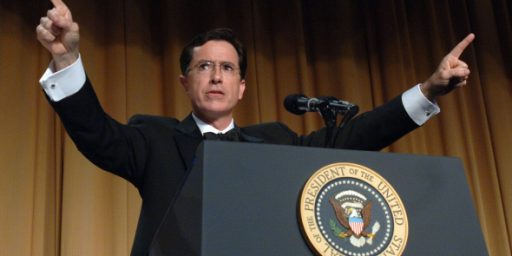
Let’s see, you came into this with an idea that unlimited funding is fine, and don’t get the joke when Colbert demonstrates that unlimited funding still exists, beneath all the fig leafs.
OK, fine.
That’s where you are coming from, but the point of Lithwick’s article is that most people think controls are in place, and want them to be in place.
IOW, “I am not shocked, because I have a minority position” is only limited commentary.
Poll: Most want limits on campaign spending
@john personna: But that’s not at all what I’m arguing. The post argues that:
1. The things Colbert is lampooning have been true for quite some time, even though he gives the impression that they’re a result of Citizen’s United.
2. I nonetheless agree with Colbert that most of the “barriers” to money in politics are a sham.
3. Even if they weren’t a sham, it’s damned near impossible to keep money out of politics absent a ban on TV advertising for campaigns, which would not only require amending the Constitution but really warp the playing field.
4. While I agree that money in politics is a problem, I don’t think money used to buy television ads that everyone can see and source is the problem.
I happen to agree with James’ #4 – I worry more about the power of lobbying (including the “revolving door”). Corruption that is legal, or at least impossible to prove is illegal in a courtroom. Quid pro quo… scratch my back while in Congress, sit on the board of directors if/when you lose an election.
That said, I’m frustrated by campaign finance too. Mostly b/c I can’t think of a good fix.
I was really responding to this:
If that is the nut, the kernel, of your objection to Colbert, then it is because you are centered in unlimited spending. That’s something most people are uncomfortable with.
As to whether spending caps are constitutional, much depends on whether money does indeed equal speech, and of course whether companies equal people.
The unlimited spending argument is really built on some “equivalences” the framers did not consider.
If we guard free speech by human people, and limit only contributions by people ($10K) and corporations ($0K) I think we’d be much better off.
We would not be abandoning our values either.
But really the thing I most object to is that your posts so “don’t get” what other people see in the Colbert exercise.
@john personna: My point is that, given that the money is going to be spent regardless–and 40 years of trying to regulate demonstrates that it is–then I’d prefer it be spent transparently.
@john personna: I’m saying a lot of things here, including that Colbert isn’t demonstrating what people seem to think he’s demonstrating. That is, he’s actually just bundling a bunch of very small contributions. The main rich guy in the process is one Stephen Colbert. But it’s not like he doesn’t already have the ability to get a lot of TV time.
@James Joyner:
To your first point, yes that is the minority position I referred to earlier.
On your second point, I don’t think that’s what people are getting. It doesn’t matter why exactly PACs and etc. are a ludicrous charade, for comedy and for most people’s concerns it is enough that they are a charade.
(Most people have a more basic repulsion to the game, and are not “inside baseball” on this.)
@john personna:
Most Americans believe campaign contributions are form of protected free speech:
http://www.firstamendmentcenter.org/madison/wp-content/uploads/2011/04/SOFA.Gallup.campaign.finance.pdf
Most Americans believe corporations and unions have the same speech rights as individuals:
http://www.firstamendmentcenter.org/madison/wp-content/uploads/2011/04/SOFA.Sept_.2010data.pdf
So yes, most Americans want limits, but because they want to limit that kind of speech, not because they don’t think it’s speech. In essence, their problem is not with Citizen’s United, but with the First Amendment itself.
@john personna:
I wasn’t aware that Constitutional rights were subject to the vicissitudes of public polling and elections.
That’s not saying, by the way, that I don’t believe that reform of some kind isn’t needed. Disclosure needs to be more rigorous than it is right now, for sure. In a computer era it’s absurd to let campaigns and PACs wait for three months before they have to disclose donors and disbursements. Make that information available in as immediate a fashion as possible, and let the people judge the message they hear accordingly.
Where the reformers lose me, though, is when they start talking about restricting political speech in any fashion.
@Doug Mataconis:
Two separate arguments, Doug. One is “do people want to limit spending?” The other is “does the Constitution really say money is speech?”
@Stormy Dragon:
I believe Doug addressed your polls 😉
John,
I wasn’t not specifically addressing anything you’d advocated, just making a general point.
As for the second point — How the act of me buying ad time on a television station for an ad on a political topic, or a candidate for office, is not political speech escapes me. How about if I wanted to spent money to print up flyers for or against a political candidate and put them on the windshields of cars, how is that not political speech?
The same thing goes for donating money to a political candidate. As long as there’s full disclosure (and more immediate disclosure than we have now) then I don’t see any government interest that overrides the individual’s rights under the First Amendment.
@john personna:
Actually, I think Doug and are making the same point, in different ways. You’re assuming that people want to limit spending because they agree with you that such spending is not speech.
Doug and I are both pointing out that they actually agree with us that it is speech; they just want to weaken the right to free speech.
@Stormy Dragon: I’ve come to the conclusion that people mostly just find the political ads extremely annoying; they don’t understand why the government acts the way it does, and if they gave it much thought, they embrace some form of conspiracy theory.
No-one had illustrated better in layman’s term’s how this whole mess works (or doesn’t).
The fact that a comedian has to do it because pundits and journalists can’t, do it (or rather won’t because the horse race is sooooooooo much easier) is the real sad joke.
BTW: We are only in February. He’s got until the end of the year to really explore what can be done.
@Stormy Dragon:
My more fundamental point is that public opinion is, in some sense, irrelevant when it comes to a Constitutional right.
@PD Shaw:
The ads are annoying which is why it’s great to have a DVR. Nonetheless, they obviously work otherwise people wouldn’t spend vast amounts of money to produce and air them. In the days before television and radio, candidates used to hire barkers, and later sound trucks, that would wander the streets blaring political slogans. Personally, I would’ve found that a lot more annoying than a commercial I can drown out by hitting fast-forward or the mute button.
I hate the fact that so much money is needed to run for congress and presidency. Look what that has brought us to. Elected buffoons doing what they were paid to do against what is best for the majority of the country. I would like limits in air time and money. I would also add anyone getting caught on the take would be mandated to prison time and fines only they could afford without loop holes.
I think there is one key part to his super PAC that is missing from the analysis:
After seeing all the shenanigans, I’d almost prefer the Austrian method of political advertising: publicly paid, mandated TV broadcasts. Like C-SPAN, but not as interesting.
Unfortunately, the U.S. has seemed to have morphed politics together with entertainment (egged on by the 24-hr “news” cycle), so I don’t expect anyone to go for this.
Politics should be boring. Very boring. Ditto for policy. If we’re going to have news coverage of policy, let’s bring out the whole schmear, with lotsa numbers and no pie charts. Straight reportage, then straight analysis. Ideally all discussions would be filmed in black and white, and discussed by the same people who showed up in the PSSC science films we used to watch at school back in the 1960s.